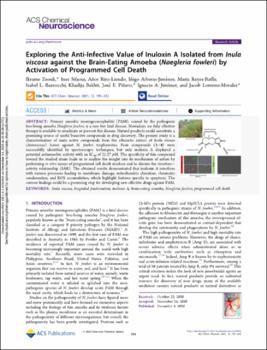Exploring the Anti-Infective Value of Inuloxin A Isolated from Inula viscosa against the Brain-Eating Amoeba (Naegleria fowleri) by Activation of Programmed Cell Death
Fecha
2021Resumen
Primary amoebic meningoencephalitis (PAM), caused by the pathogenic
free-living amoeba Naegleria fowleri, is a rare but fatal disease. Nowadays, no fully effective
therapy is available to erradicate or prevent this disease. Natural products could constitute a
promising source of useful bioactive compounds in drug discovery. The present study is a
characterization of main active compounds from the ethanolic extract of Inula viscosa
(Asteraceae) leaves against N. fowleri trophozoites. Four compounds (1−4) were
successfully identified by spectroscopic techniques, but only inuloxin A displayed a
potential antiamoebic activity with an IC50 of 21.27 μM. The specificity of this compound
toward the studied strain leads us to analyze the insight into its mechanism of action by
performing in vitro assays of programmed cell death markers and to discuss the structure−
activity relationship (SAR). The obtained results demonstrated that inuloxin A interferes
with various processes leading to membrane damage, mitochondria alteration, chromatin
condensation, and ROS accumulation, which highlight features specific to apoptosis. The
current findings could be a promising step for developing new effective drugs against PAM.






